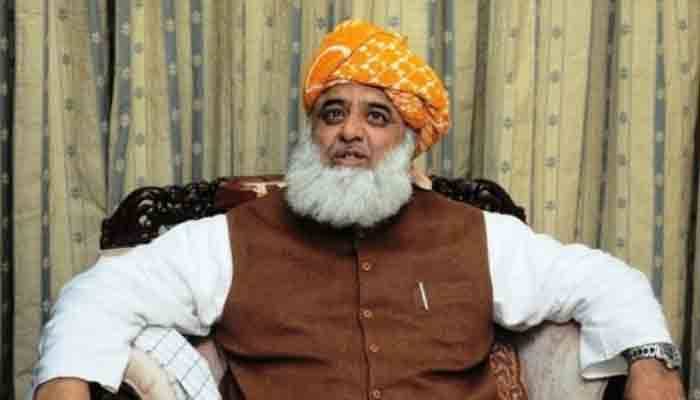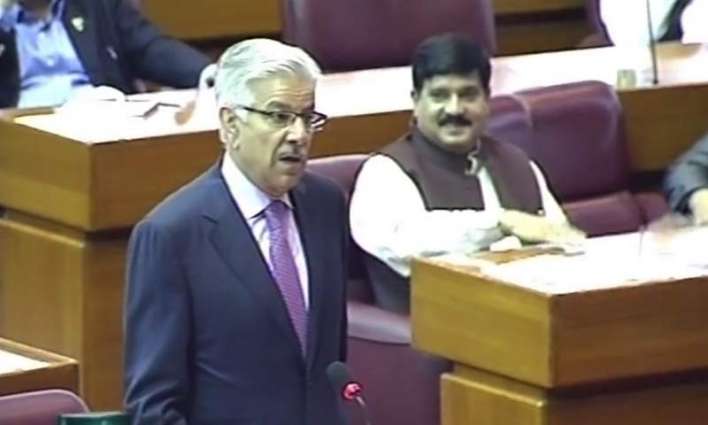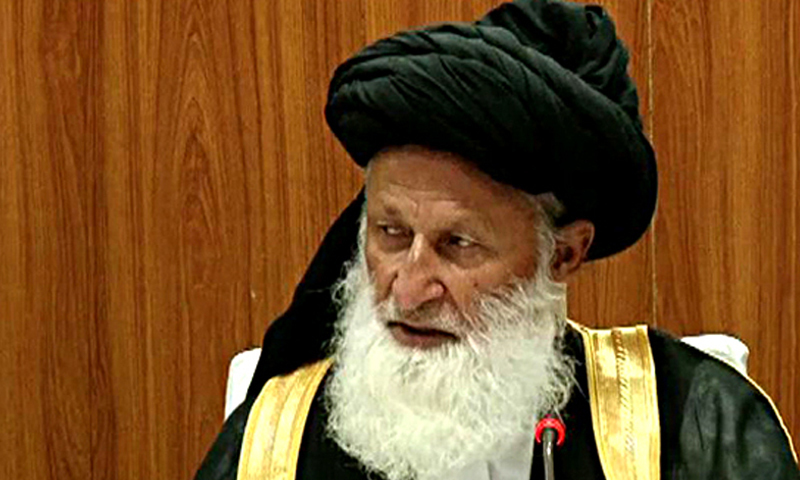
Jamiat-e-Ulema Islam-Fazl (JUI-F) chief Fazlur Rehman has a knack for remaining relevant in politics by forging alliances with mainstream political parties. These days he is in the news for his anti-government long march which is to begin on October 30. Whether or not his march will lead to the government's downfall is yet to be seen. But as he prepares to march to Islamabad, we look at some interesting facts about Fazl.
He’s Been In Positions Of Power In Every Govt Before The Last General Elections
Fazl was elected as a member of the National Assembly (MNA) of Pakistan in the general elections of 1988 for the first time from his hometown Dera Ismail Khan (DI Khan). He remained as MNA until May 2018.
He was elected MNA again in the 1993 general elections for the second time on Islamic Jamhoori Mahaz ticket from a DI Khan seat. He was appointed as the chairman of the Standing Committee for Foreign Affairs in NA. During this time, he made connections with the Afghan Taliban.
Fazl was elected as MNA in the general elections of 2002 for the third time on Muttahida Majlis-e-Amal (MMA) ticket.
After winning the election, he became a potential candidate for the post of prime minister. He served as the leader of the opposition from 2004 to 2007.
In the general elections of 2008, Fazl ran for the NA seat for the sixth time on a MMA ticket from two constituencies, including NA-24 DI Khan which is his traditional constituency and NA-26 Bannu. In September 2008, he was elected chairman of the Kashmir committee of the NA. He was then elected as MNA for the fourth time on MMA ticket from Bannu constituency.
In May 2014, the then prime minister Nawaz Sharif gave him the status of a federal minister for being the chairman of the special committee of the National Assembly on Kashmir. In August 2017, the then prime minister Shahid Khaqan Abbasi gave him the same status again.
On August 27, 2018, several opposition parties, including Pakistan Muslim League-Nawaz (PML-N), nominated him as a candidate for the 2018 presidential election.
He Has Been Attacked By Taliban Several Times
Fazl has been generally considered a pro-Taliban politician known for his close ties to the Islamic Emirate of Afghanistan. By 2008, Fazl distanced himself from the Taliban and other hardliners and started calling himself a moderate.
In March 2011, the JUIF chief was targeted in a suicide bomb attack in which 13 people lost their lives.
A further 21 people were injured in the explosion, which was detonated by a man who walked towards Fazl’s convoy as he travelled to a political rally in Charsadda in Khyber Pukhtunkhwa (KP), close to the Afghan border. He and his close companions remained unharmed in the attack.
It was the second suicide bomb attack on the JUI-F chief in two days. At least 12 people were also killed in another attack when a suicide bomber riding a motorbike attacked a crowd of people who were waiting for Fazl to address a rally in Swabi, KP.
In October 2014, at least two people were killed and dozens injured when a suspected suicide bomber detonated his explosives outside a JUI-F rally in Quetta. Fazl remained unhurt in the attack, which targeted his bullet-proof vehicle.
Attacks against the JUI-F can be dated back to 2008, when the JUI-F became part of Pakistan’s coalition government after participating in the country’s general elections. By showing support for democracy, the JUI-F chief turned his former patrons in the Pakistani Taliban into enemies.
Why He’s Called 'Diesel' By His Opponents
During Benazir Bhutto’s government, Fazl was in charge of the Ministry of Petroleum. He used his ministry to give diesel permits to Afghanistan. Opposition parties claimed that Fazl used the permits for corruption.
He was given the title of “Maulana Diesel” by Khawaja Asif in 1996. But no one has been successful in proving these allegations against Fazl so far.

Nonetheless, the name has stuck with him and has been widely used by Pakistan Tehreek-e-Insaf (PTI) chief Imran Khan in his political rallies.
Wiki Leaks About His Meeting With US Ambassador Anne Patterson
In 2007, Fzal invited the then US Ambassador to Pakistan Anne Patterson to a dinner in which he sought her support in becoming prime minister of Pakistan. He also expressed the desire to visit the US.
According to a WikiLeaks cable, the JUI-F chief indicated to the US that his “still significant” number of votes were “up for sale”.
Patterson wrote: “At one point in the conversation, Rehman asked the Ambassador if the USG would deal with him if he was elected as Prime Minister and cautioned the USG not to put all of its eggs in the basket of Benazir Bhutto. Ambassador noted that it was not USG policy to crown any particular leader in Pakistan….Rehman indicated his desire to travel to the US and suggested he could lobby the Congress and American think tanks as well as Benazir Bhutto.”
However, the JUI-F chief later denied asking for the US ambassador’s help to elevate himself to the position of prime minister of Pakistan.
His Party Has Been Opposed To Every Progressive Legislation In Parliament
Well, nothing interesting about being opposed to progressive laws, of course. But this particular fact about him is relevant since his march is being supported by some progressives as well. Fazl and his party has mostly been opposed to progressive legislation in Parliament. His party strongly opposed the Protection of Women Against Violence Act, or Women’s Protection Act (WPA), which was adopted by the Sindh and Balochistan provincial assemblies in 2013 and 2014 respectively. They were followed by Punjab.
The KP government sent a similar bill to the CII for review, which it rejected on the basis of being ‘unIslamic’. The JUI-F had spearheaded the efforts against the WPA.
The Council of Islamic Ideology (CII), a constitutional body that advises the legislature on a bill’s compatibility with Islam, deemed the bill “un-Islamic.” In January, lawmakers withdrew a bill designed to curb child marriages following CII’s vociferous condemnation.
CII Chairman Muhammad Sherani also added fuel to the controversy back then when he said that Islam allowed a husband to ‘lightly’ beat his wife ‘if needed’.

This statement received severe backlash from the civil society and progressive movements in the country.
He’s Been In Positions Of Power In Every Govt Before The Last General Elections
Fazl was elected as a member of the National Assembly (MNA) of Pakistan in the general elections of 1988 for the first time from his hometown Dera Ismail Khan (DI Khan). He remained as MNA until May 2018.
He was elected MNA again in the 1993 general elections for the second time on Islamic Jamhoori Mahaz ticket from a DI Khan seat. He was appointed as the chairman of the Standing Committee for Foreign Affairs in NA. During this time, he made connections with the Afghan Taliban.
Fazl was elected as MNA in the general elections of 2002 for the third time on Muttahida Majlis-e-Amal (MMA) ticket.
After winning the election, he became a potential candidate for the post of prime minister. He served as the leader of the opposition from 2004 to 2007.
In the general elections of 2008, Fazl ran for the NA seat for the sixth time on a MMA ticket from two constituencies, including NA-24 DI Khan which is his traditional constituency and NA-26 Bannu. In September 2008, he was elected chairman of the Kashmir committee of the NA. He was then elected as MNA for the fourth time on MMA ticket from Bannu constituency.
In May 2014, the then prime minister Nawaz Sharif gave him the status of a federal minister for being the chairman of the special committee of the National Assembly on Kashmir. In August 2017, the then prime minister Shahid Khaqan Abbasi gave him the same status again.
On August 27, 2018, several opposition parties, including Pakistan Muslim League-Nawaz (PML-N), nominated him as a candidate for the 2018 presidential election.
He Has Been Attacked By Taliban Several Times
Fazl has been generally considered a pro-Taliban politician known for his close ties to the Islamic Emirate of Afghanistan. By 2008, Fazl distanced himself from the Taliban and other hardliners and started calling himself a moderate.
In March 2011, the JUIF chief was targeted in a suicide bomb attack in which 13 people lost their lives.
A further 21 people were injured in the explosion, which was detonated by a man who walked towards Fazl’s convoy as he travelled to a political rally in Charsadda in Khyber Pukhtunkhwa (KP), close to the Afghan border. He and his close companions remained unharmed in the attack.
It was the second suicide bomb attack on the JUI-F chief in two days. At least 12 people were also killed in another attack when a suicide bomber riding a motorbike attacked a crowd of people who were waiting for Fazl to address a rally in Swabi, KP.
In October 2014, at least two people were killed and dozens injured when a suspected suicide bomber detonated his explosives outside a JUI-F rally in Quetta. Fazl remained unhurt in the attack, which targeted his bullet-proof vehicle.
Attacks against the JUI-F can be dated back to 2008, when the JUI-F became part of Pakistan’s coalition government after participating in the country’s general elections. By showing support for democracy, the JUI-F chief turned his former patrons in the Pakistani Taliban into enemies.
Why He’s Called 'Diesel' By His Opponents
During Benazir Bhutto’s government, Fazl was in charge of the Ministry of Petroleum. He used his ministry to give diesel permits to Afghanistan. Opposition parties claimed that Fazl used the permits for corruption.
He was given the title of “Maulana Diesel” by Khawaja Asif in 1996. But no one has been successful in proving these allegations against Fazl so far.

Nonetheless, the name has stuck with him and has been widely used by Pakistan Tehreek-e-Insaf (PTI) chief Imran Khan in his political rallies.
Wiki Leaks About His Meeting With US Ambassador Anne Patterson
In 2007, Fzal invited the then US Ambassador to Pakistan Anne Patterson to a dinner in which he sought her support in becoming prime minister of Pakistan. He also expressed the desire to visit the US.
According to a WikiLeaks cable, the JUI-F chief indicated to the US that his “still significant” number of votes were “up for sale”.
Patterson wrote: “At one point in the conversation, Rehman asked the Ambassador if the USG would deal with him if he was elected as Prime Minister and cautioned the USG not to put all of its eggs in the basket of Benazir Bhutto. Ambassador noted that it was not USG policy to crown any particular leader in Pakistan….Rehman indicated his desire to travel to the US and suggested he could lobby the Congress and American think tanks as well as Benazir Bhutto.”
However, the JUI-F chief later denied asking for the US ambassador’s help to elevate himself to the position of prime minister of Pakistan.
His Party Has Been Opposed To Every Progressive Legislation In Parliament
Well, nothing interesting about being opposed to progressive laws, of course. But this particular fact about him is relevant since his march is being supported by some progressives as well. Fazl and his party has mostly been opposed to progressive legislation in Parliament. His party strongly opposed the Protection of Women Against Violence Act, or Women’s Protection Act (WPA), which was adopted by the Sindh and Balochistan provincial assemblies in 2013 and 2014 respectively. They were followed by Punjab.
The KP government sent a similar bill to the CII for review, which it rejected on the basis of being ‘unIslamic’. The JUI-F had spearheaded the efforts against the WPA.
The Council of Islamic Ideology (CII), a constitutional body that advises the legislature on a bill’s compatibility with Islam, deemed the bill “un-Islamic.” In January, lawmakers withdrew a bill designed to curb child marriages following CII’s vociferous condemnation.
CII Chairman Muhammad Sherani also added fuel to the controversy back then when he said that Islam allowed a husband to ‘lightly’ beat his wife ‘if needed’.

This statement received severe backlash from the civil society and progressive movements in the country.
